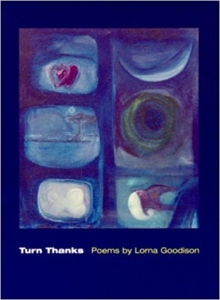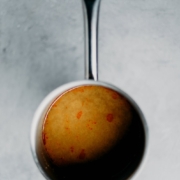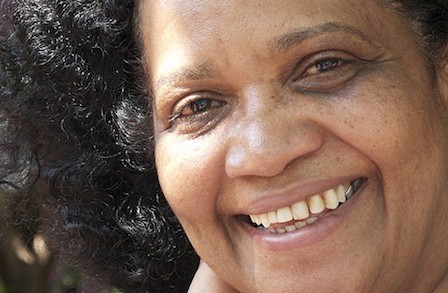Lorna Goodison, Turn Thanks
TURN THANKS, Lorna Goodison. University of Illinois Press, Urbana and Chicago, 1999, 95 pages, $15.95 paper,  https://www.press.uillinois.edu.
https://www.press.uillinois.edu.
The first two sections here (of four) are stories set into lines—stories of her family and gratitude, too. You kind of have to enter them with an open mind. And when you do, the wealth of images and playfulness of the language begin to find you.
Several poems celebrate place rather than ancestry. A poem ultimately about Columbus’s arrival in the Caribbean begins: “There is a perfume rising off the sea today. / A scent of almond top notes and base notes of ambergris”; and culminates:
I think about Columbus and how he thought at first
these islands would be a source of gold,
of cotton and mastic, aloes, wood, and things invaluableto him, poor thing. That sweet smell rising off the sea today.
May the perfumed tides wash my people now bright berries.
It’s clear what the better bounty is—a landscape and seascape rich in sights and scents, plenty, for those able to value it.
And then there’s the section, “The Mango of Poetry,” which addresses a number of poets, including Yeats and Akhmatova, and artists, too. Another sort of ancestry. (My attempts to categorize this book keep falling apart.) In the last section, “God a Me,” lyrical poems abound.
The poem I’m sharing is my favorite in the collection, the first in the book, and the first in an unnumbered sequence of three poems for her mother.
After the Green Gown of My Mother Gone Down
August, her large heart slows down then stops.
Fall now, and trees flame, catch a fire and riotlast leaves in scarlet and gold fever burning.
Remember when you heard Bob Marley hymn“Redemption Song,” and from his tone and timbre
you sensed him traveling? He had sent the band homeand was just keeping himself company, cooling star,
sad rudeboy fretting on cowboy box guitarin a studio with stray echo and wailing sound
lost singing scatting through the door of no return.When the green goes, beloved, the secret is opened.
The breath falls still, the life covenant is broken.Dress my mother’s cold body in a deep green gown.
Catch a fire and let fall and flame time comeafter the green gown of my mother gone down.
—Lorna Goodison
Turn Thanks returns gratitude even for hatred and ill-use. These poems reminded me to be grateful for the wild woman who shows up, uninvited, “disheveled and weeping.” Who knows from where the next line will come?
To read more about Goodison, see my previous post, or go to Poetry Foundation.



